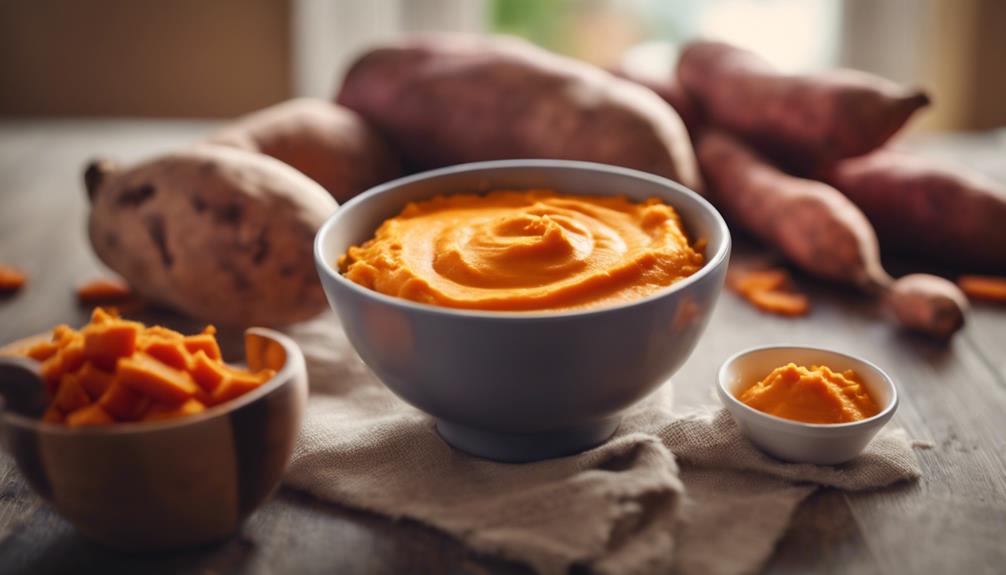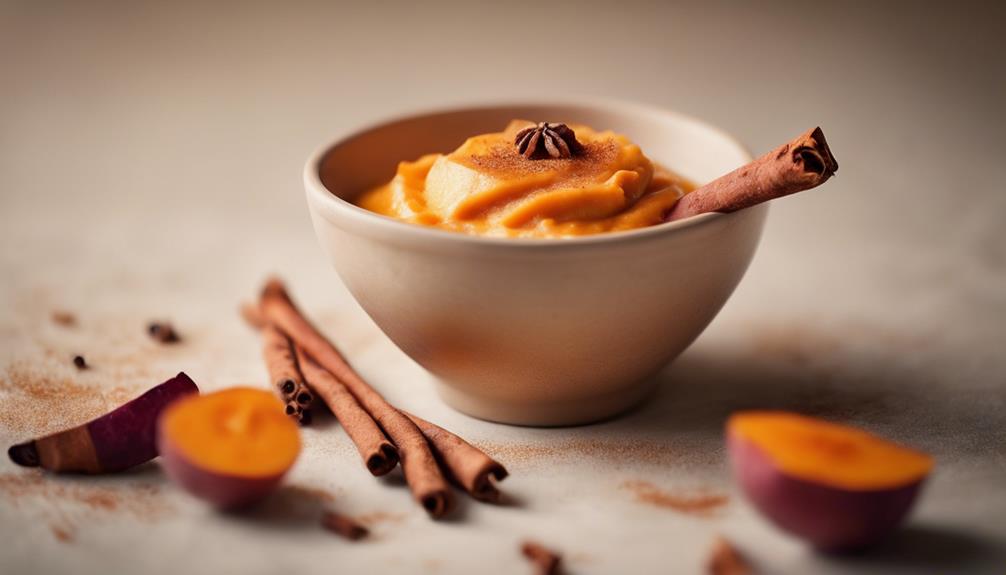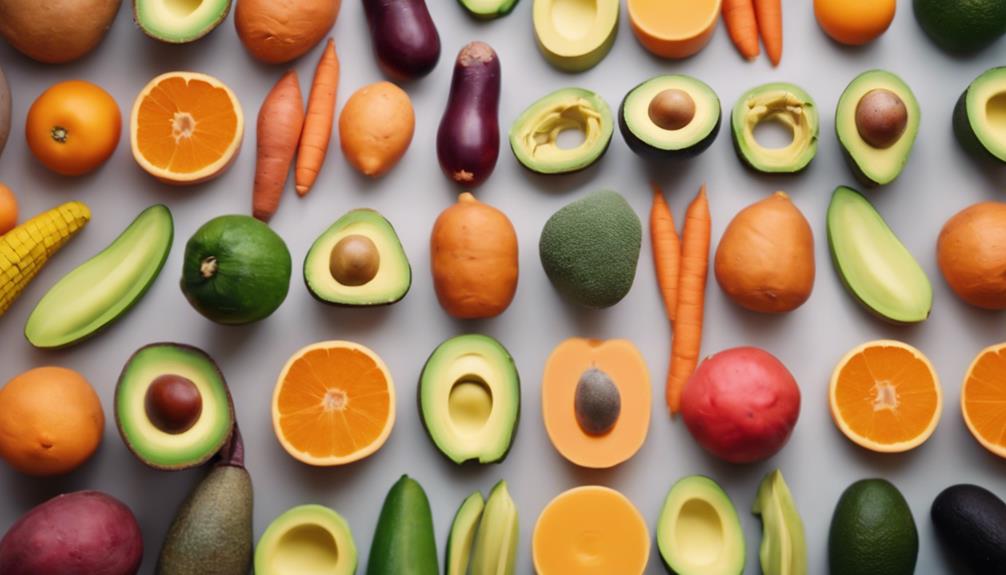Hello there, parent on a mission! Sweet potato puree is an excellent choice for your baby. Filled with Vitamin A, C, and fiber, it promotes vision, growth, digestion, and more! Opting for firm sweet potatoes like Beauregard or Jewel is crucial. Keep them in a cool place for up to a month. Cook by baking, steaming, or boiling to achieve that perfect puree texture. Add delicious flavors like cinnamon for enhancement. Enjoy it plain, with yogurt, fruit, or in recipes. Get ready for a flavor and nutrient boost that your baby will adore! Continue exploring for even more helpful tips and tricks!
Key Takeaways
- Packed with Vitamin A, C, and fiber for baby's growth and immunity.
- Supports iron absorption and aids digestion, promoting satiety.
- Easy to cook and puree, enhancing nutrient retention for baby's health.
- Versatile usage in homemade recipes like muffins, pancakes, and smoothies.
- Enhances calcium and protein intake when paired with yogurt for babies.
Sweet Potato Nutrients
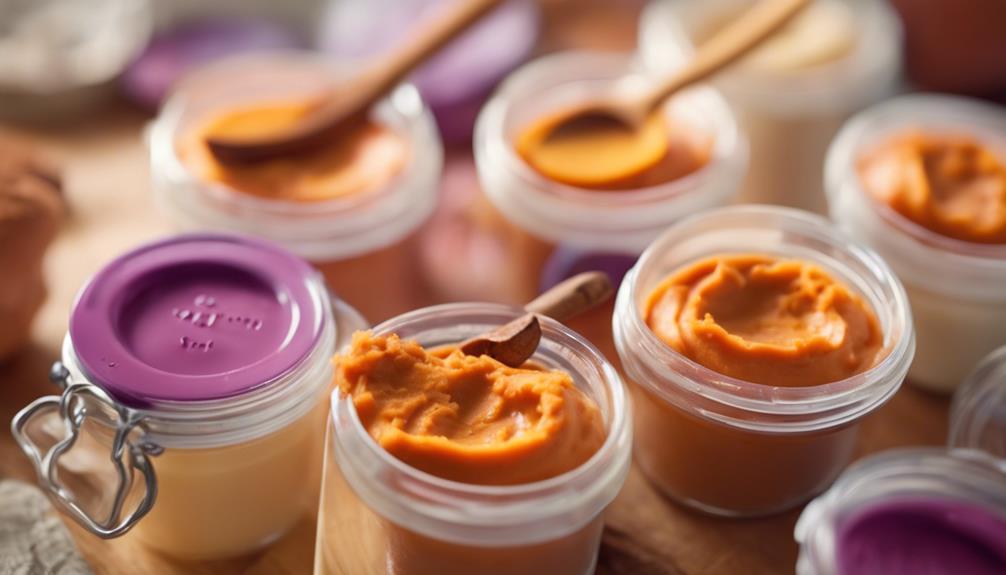
Sweet potato puree offers a rich array of essential nutrients important for your baby's growth and development. Packed with Vitamin A, Vitamin C, fiber, and other beneficial components, sweet potatoes are a powerhouse of nutrition. Vitamin A plays an essential role in supporting your baby's vision, immune system, and cell growth, while Vitamin C aids in the absorption of iron and promotes a healthy immune system. The fiber content in sweet potatoes helps with digestion and keeps your baby feeling full and satisfied.
These essential nutrients found in sweet potato puree aren't only necessary for your baby's development but also contribute to the delicious flavor that makes it a favorite among little ones. Introducing sweet potato puree to your baby's diet can provide a range of health benefits while delighting their taste buds.
Buying & Storing Sweet Potatoes

When shopping for sweet potatoes, look for firm, unwrinkled ones with orange flesh to guarantee freshness and best flavor. Different varieties like Beauregard, Jewel, or Garnet offer a range of textures and taste profiles, so feel free to experiment with these options to find your favorite.
To keep your sweet potatoes fresh for longer, store them in a cool, dark place for up to a month. Remember to avoid refrigerating them as it can affect their taste and texture negatively. Proper storage techniques, such as keeping them away from moisture and light, will help maintain the quality of your sweet potatoes.
Cooking Sweet Potatoes for Puree
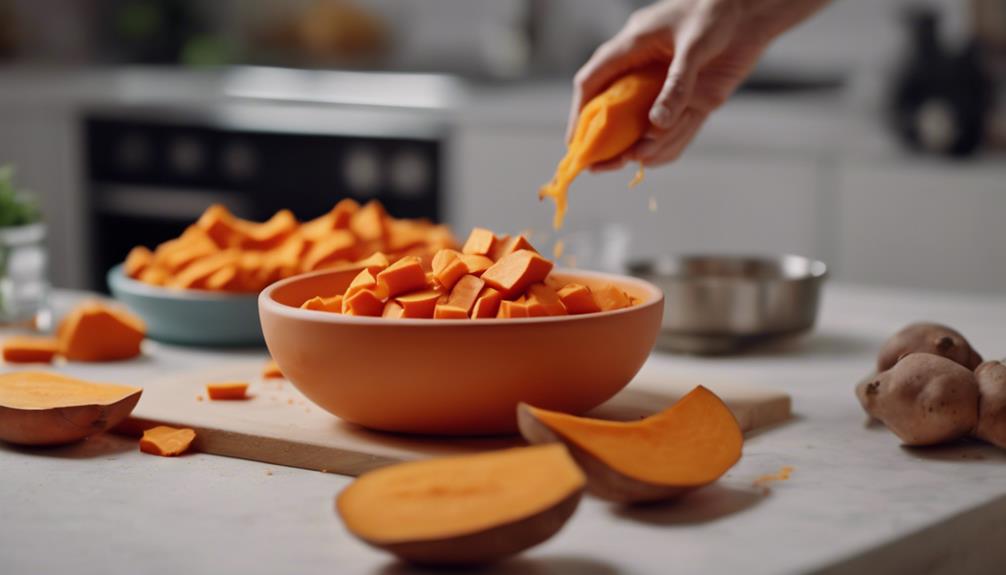
To prepare sweet potatoes for puree, cooking methods such as steaming, boiling, or baking are recommended to achieve a smooth consistency suitable for babies.
When baking sweet potatoes, set the oven to 400°F and let them bake for about an hour until they turn tender and flavorful. Baking helps in creating a soft texture that's perfect for pureeing.
Steamed sweet potatoes are another excellent option as they can be easily mashed or blended to create a creamy and nutritious puree that your little one will love.
Boiling sweet potatoes until tender is also a great way to prepare them for pureeing, allowing for easy removal of the skin and effortless processing into a baby-friendly meal.
Remember, cooking sweet potatoes not only softens them but also breaks down their fibers, making them easier to digest for your little munchkin.
Pureeing Sweet Potatoes
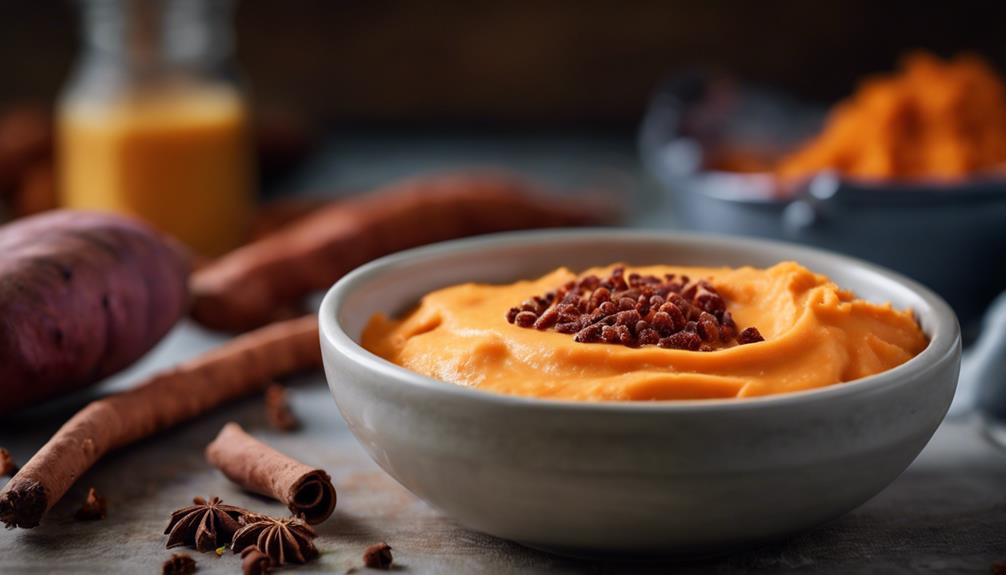
When it comes to pureeing sweet potatoes for your baby, having the right equipment is key. Make sure to use a food processor, blender, immersion blender, or potato masher for smooth and creamy results.
To retain maximum nutrients, consider leaving the skins on or adding flavorful twists like cinnamon or nutmeg for a tasty touch.
Equipment for Pureeing
Consider utilizing a food processor, blender, immersion blender, or potato masher to puree sweet potatoes effectively. These tools are essential for achieving a smooth and consistent texture, making the puree suitable for babies. The choice of equipment plays an important role in determining the final quality of the sweet potato puree.
A food processor is perfect for those seeking a quick and efficient method, allowing you to control the consistency with ease. Blenders are another great option, providing a smooth finish ideal for baby food.
If you prefer more hands-on control, an immersion blender might be the right choice, giving you the flexibility to adjust the texture as you go. On the other hand, a classic potato masher can deliver a rustic feel to the puree, offering a different texture option.
Each tool brings its unique advantages, so pick the one that suits your preferences and desired outcome.
Nutrient Retention Tips
Enhancing the nutrient retention of sweet potatoes involves pureeing them to preserve their fiber, vitamins, and minerals effectively.
When making sweet potato puree for your little one, using a food processor or blender will help achieve a smooth and consistent texture, ensuring that your baby gets all the essential nutrients packed in those vibrant orange spuds.
Don't peel the sweet potatoes before pureeing; including the skin adds extra fiber and nutrients to the mix, boosting the overall nutritional value.
Cooling the cooked sweet potatoes before blending not only helps maintain their bright color but also locks in that delicious sweet flavor your baby will love.
By following these tips, you can create a nutrient-rich sweet potato puree that not only benefits your baby's health but also delights their taste buds.
Flavorful Additions
To elevate the taste of your sweet potato puree and introduce variety, consider incorporating flavorful additions like cinnamon, olive oil, or a mix of fruits and vegetables. Adding a sprinkle of cinnamon not only enhances the flavor but also provides additional health benefits to your baby's meal.
Sweet potato puree, rich in nutrients, can be a versatile base for various combinations. Mixing it with fruits or vegetables not only boosts the flavor but also adds more nutrients to the dish, making it a wholesome choice for your little one.
The smooth texture of sweet potato puree makes it easy for babies to digest, ensuring a pleasant eating experience. For a touch of healthy fats and a rich taste, consider incorporating olive oil into the puree. This addition not only enhances the flavor profile but also provides essential nutrients for your baby's growth and development.
Using Sweet Potato Puree
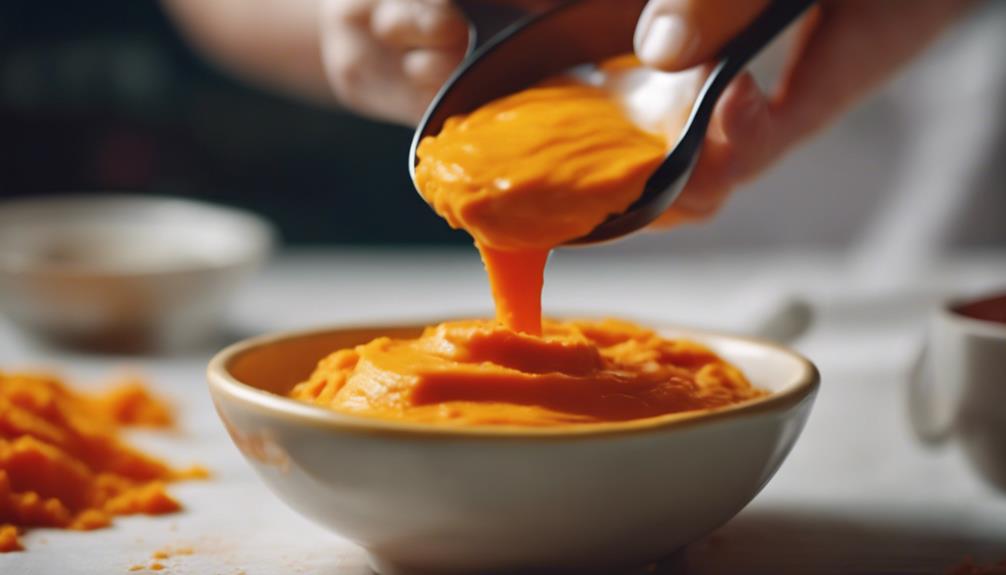
When it comes to using sweet potato puree for your little one, the possibilities are endless!
You can get creative by incorporating it into various baby food recipes to tantalize their taste buds and provide essential nutrients.
Don't forget to explore serving suggestions and storage tips to make the most out of this nutritious and versatile ingredient.
Serving Suggestions
For added variety and nutrition in your baby's diet, consider mixing sweet potato puree with different ingredients to create delicious meal combinations.
Sweet potato puree is a fantastic base for serving suggestions, making it a versatile option for baby food. You can mix it with rice, dal, or yogurt to introduce various textures and flavors to your little one's palate.
For a naturally sweet and nutrient-rich meal, combine sweet potato puree with fruits like apples, pears, or bananas. This not only enhances the flavor but also adds a touch of sweetness that babies love.
Additionally, you can use sweet potato puree as a base for homemade recipes such as pancakes, muffins, or smoothies, providing a nutritious twist to these classic dishes.
To make meal prep easier, freeze sweet potato puree in small portions for convenient storage, ensuring you always have a nutritious option ready for your baby's mealtime.
Storage Tips
Consider storing sweet potato puree in airtight containers in the refrigerator for up to 3-5 days to maintain its freshness. For longer storage, freezing sweet potato puree in ice cube trays is a convenient option, lasting up to 3 months. When ready to use frozen puree, simply thaw it in the refrigerator overnight or gently reheat on the stovetop or microwave. To guarantee best quality, avoid refreezing thawed puree. Remember to label your containers with the preparation date to track storage time and uphold freshness.
| Storage Method | Duration | Thawing Instructions |
|---|---|---|
| Refrigeration | 3-5 days | – |
| Freezing | Up to 3 months | Refrigerate overnight or reheat gently |
Sweet Potato Puree for Babies
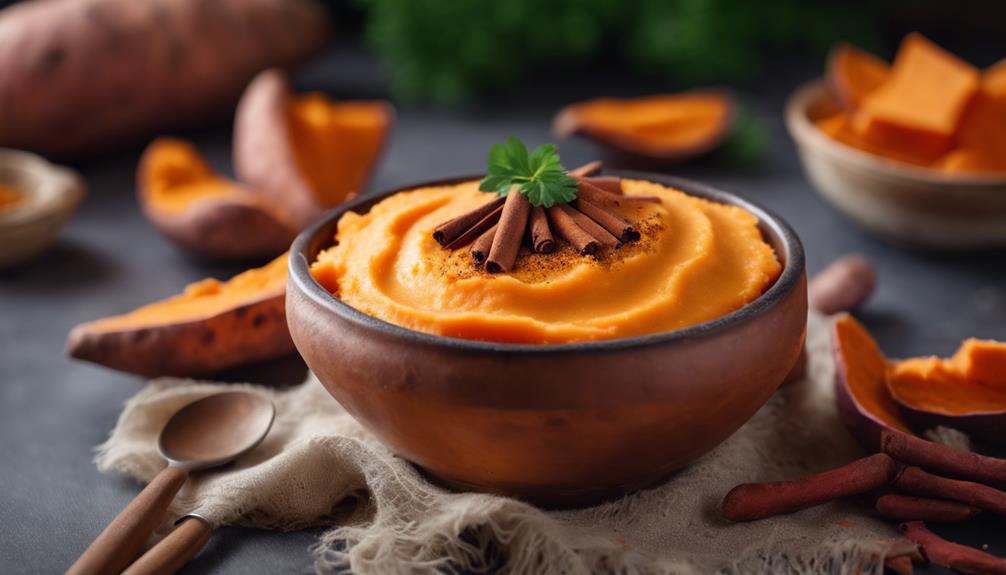
You can introduce sweet potato puree to your baby as an early and nutritious addition to their diet. Homemade sweet potato puree is a fantastic choice for your little one's first foods.
It's easy to make sweet potato baby food by simply cooking sweet potatoes until they're soft and then pureeing them into a smooth consistency. This pureed sweet potatoes aren't only rich in essential vitamins A and C but also offer a delightful flavor that babies tend to enjoy.
Starting solids with sweet potato puree around 6 months of age is a great way to introduce healthy nutrients into your baby's diet.
You can get creative with baby food recipes incorporating sweet potato puree, mixing it with other fruits or vegetables to enhance the flavor and texture.
Recipe Card and Serving Suggestions
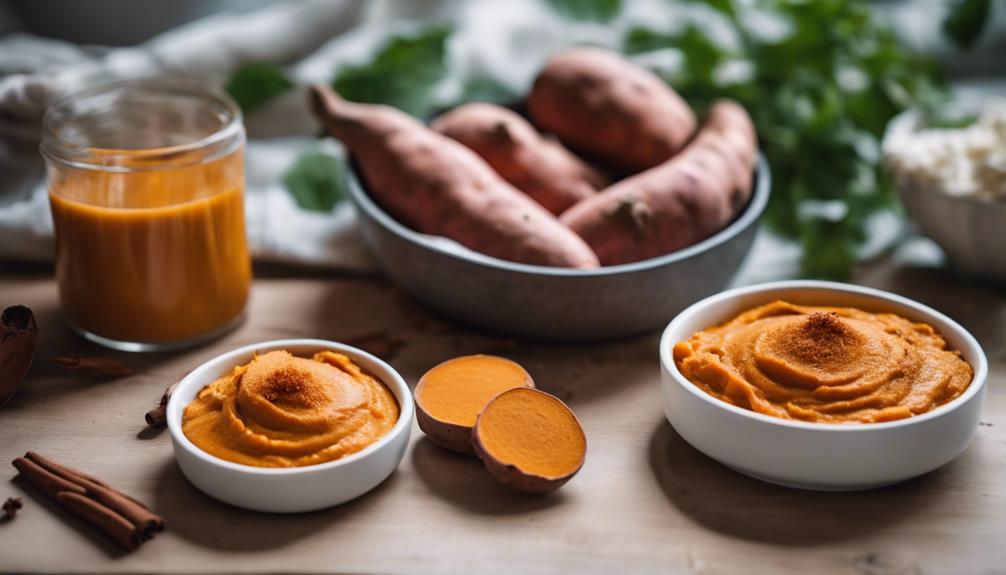
To investigate the recipe card and serving suggestions for sweet potato puree, let's explore easy and nutritious ways to introduce this homemade baby food option. The table below showcases versatile serving ideas and storage tips to make feeding your little one a breeze:
| Serving Suggestions | Description | Nutritional Benefits |
|---|---|---|
| Standalone Puree | Perfect as a quick meal or snack | Rich in fiber, vitamins, and potassium |
| Mix with Rice or Dal | Adds variety and texture to meals | Boosts fiber intake |
| Serve with Yogurt | Creamy and delicious combo | Enhances calcium and protein intake |
| Combine with Fruits | Introduces new flavors | Increases vitamin C intake |
| Storage Tips | Refrigerate in airtight containers for up to 3 days or freeze for longer shelf life | Maintains freshness and convenience |
Frequently Asked Questions
What Are the Nutritional Benefits of Sweet Potato for Baby?
Sweet potatoes offer your baby a nutrient-rich option, packed with fiber, vitamins, and minerals. They support brain development, boost the immune system, and provide a sweet taste babies love. Introduce sweet potato puree around 6 months to diversify their diet.
Is It OK for Baby to Eat Sweet Potato Everyday?
Including sweet potatoes in your baby's daily diet is generally safe, as they provide essential vitamins and fiber. Maintain a balanced diet by incorporating a variety of foods. Moderation is key to prevent potential digestive issues.
How Do You Get the Best Nutrients From Sweet Potatoes?
To get the best nutrients from sweet potatoes, you can try baking them. This method helps retain the maximum nutritional benefits for your baby. Baking sweet potatoes is simple, flavorful, and keeps the goodness intact.
What to Put With Sweet Potatoes for Baby?
When making baby food with sweet potatoes, try pairing them with apple, pea, avocado, banana, or yogurt purees for variety and nutrition. Mixing sweet potatoes with rice, ghee, butter, or jaggery syrup can enhance flavors.
Conclusion
To sum up, sweet potato puree is a nutritious and delicious option for your baby's diet. Packed with essential vitamins and minerals, it's easy to prepare and can be stored for future meals.
Just like little Liam, whose face lit up with delight after tasting his first spoonful of sweet potato puree, your baby will surely enjoy this tasty treat.
So why wait? Get cooking and nourish your little one with the goodness of sweet potatoes today!

